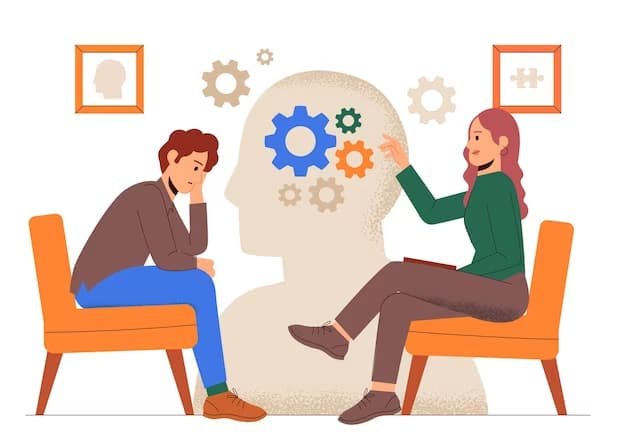Counseling for confidence-building is a transformative journey that empowers individuals to break free from the shackles of self-doubt and embrace their true selves. In a world that often places immense pressure on individuals to conform to societal standards, maintaining a positive self-image can be a challenging endeavor. The journey toward building confidence and cultivating healthy self-esteem is deeply personal, and for many, seeking professional guidance through counseling can be a transformative step. In this blog, we will explore the importance of counseling in building a positive self-image, the techniques employed by counselors, and the profound impact it can have on individuals seeking to enhance their confidence.
The Struggle with Self-Image
The Influence of Society and Media
From unrealistic beauty standards to societal expectations, individuals are bombarded with messages that can adversely affect their self-image. Social media, in particular, has created a platform for constant comparison, making it challenging for many to embrace their uniqueness and feel confident in their own skin.
The Impact on Mental Health
Poor self-image and low confidence can contribute to mental health challenges, including anxiety and depression. The negative cycle of self-doubt can hinder personal and professional growth, affecting relationships and overall well-being.
The Role of Counseling in Confidence Building

Creating a Safe Space
One of the fundamental aspects of counseling is creating a safe and non-judgmental space. Counselors provide individuals with an environment where they can express their thoughts, fears, and insecurities without fear of criticism, fostering a sense of trust and openness.
Identifying Root Causes
Counselors work collaboratively with clients to identify the root causes of low self-esteem and confidence issues. This process often involves exploring past experiences, societal influences, and personal beliefs that may contribute to a negative self-image.
Challenging Negative Beliefs
Through therapeutic techniques such as cognitive-behavioral therapy (CBT), counselors help individuals challenge and reframe negative beliefs about themselves. This involves exploring the validity of these beliefs and replacing them with more positive and empowering thoughts.
Developing Self-Awareness
Counseling encourages self-reflection and self-awareness. By gaining a deeper understanding of one’s thoughts, emotions, and behaviors, individuals can start to make positive changes and develop a more realistic and compassionate view of themselves.
Techniques Used in Confidence-Building Counseling

Positive Affirmations
Counselors often incorporate positive affirmations as a tool to reshape negative self-talk. Through repetition of affirmations that emphasize strengths and positive attributes, individuals can gradually shift their mindset and build a more positive self-image.
Visualization Exercises
Visualization exercises help individuals create mental images of themselves succeeding, achieving goals, and feeling confident. This technique taps into the power of the mind to manifest positive outcomes, reinforcing a sense of self-efficacy.
Goal Setting and Achievement
Setting and achieving small, realistic goals is a crucial aspect of confidence-building counseling. Success in these goals, no matter how minor, contributes to a sense of accomplishment and reinforces the belief that positive change is possible.
Role-playing and Social Skills Development
For those struggling with social confidence, counselors may employ role-playing exercises to practice social interactions in a safe environment. This technique helps individuals build social skills, enhance communication, and reduce anxiety in real-life social situations.
Overcoming Stigma and Seeking Help

Breaking the Stigma
Despite the increasing awareness of the benefits of counseling, there remains a stigma associated with seeking mental health support. It’s essential to break down these barriers and emphasize that seeking counseling for confidence-building is a proactive and empowering choice.
Normalizing Self-Care
Promoting the idea of counseling as a form of self-care can contribute to normalizing the seeking of professional support. Just as physical health requires attention and care, mental and emotional well-being are equally important components of overall wellness.
If you plan to visit a counselor, Contact us..
Practical Tips for Building Confidence
Embrace Self-Compassion
Cultivating self-compassion involves treating oneself with kindness and understanding, especially during challenging times. Rather than harsh self-criticism, individuals can learn to speak to themselves with the same empathy they would offer a friend.
Surround Yourself with Positivity
Positive influences, whether in the form of supportive friends, inspirational literature, or affirming environments, can contribute significantly to building confidence. Actively seek out sources of positivity that uplift and encourage personal growth.
Set and Achieve Realistic Goals
Breaking down larger goals into smaller, achievable steps allows individuals to experience success incrementally. Each achievement builds confidence and contributes to a positive self-image.
Practice Self-Care Regularly
Self-care is fundamental to building confidence. Taking time for activities that bring joy, relaxation, and a sense of fulfillment contributes to overall well-being and reinforces a positive self-image.
Conclusion:
Counseling for confidence-building is a transformative journey that empowers individuals to break free from the shackles of self-doubt and embrace their true selves. By creating a safe space for exploration and employing effective therapeutic techniques, counselors play a pivotal role in helping individuals build a positive self-image. The stories of those who have successfully navigated this journey serve as a testament to the profound impact counseling can have on one’s mental and emotional well-being. As we continue to break down stigmas surrounding mental health, let us recognize the importance of seeking professional support in the pursuit of confidence, self-love, and a fulfilling life.
